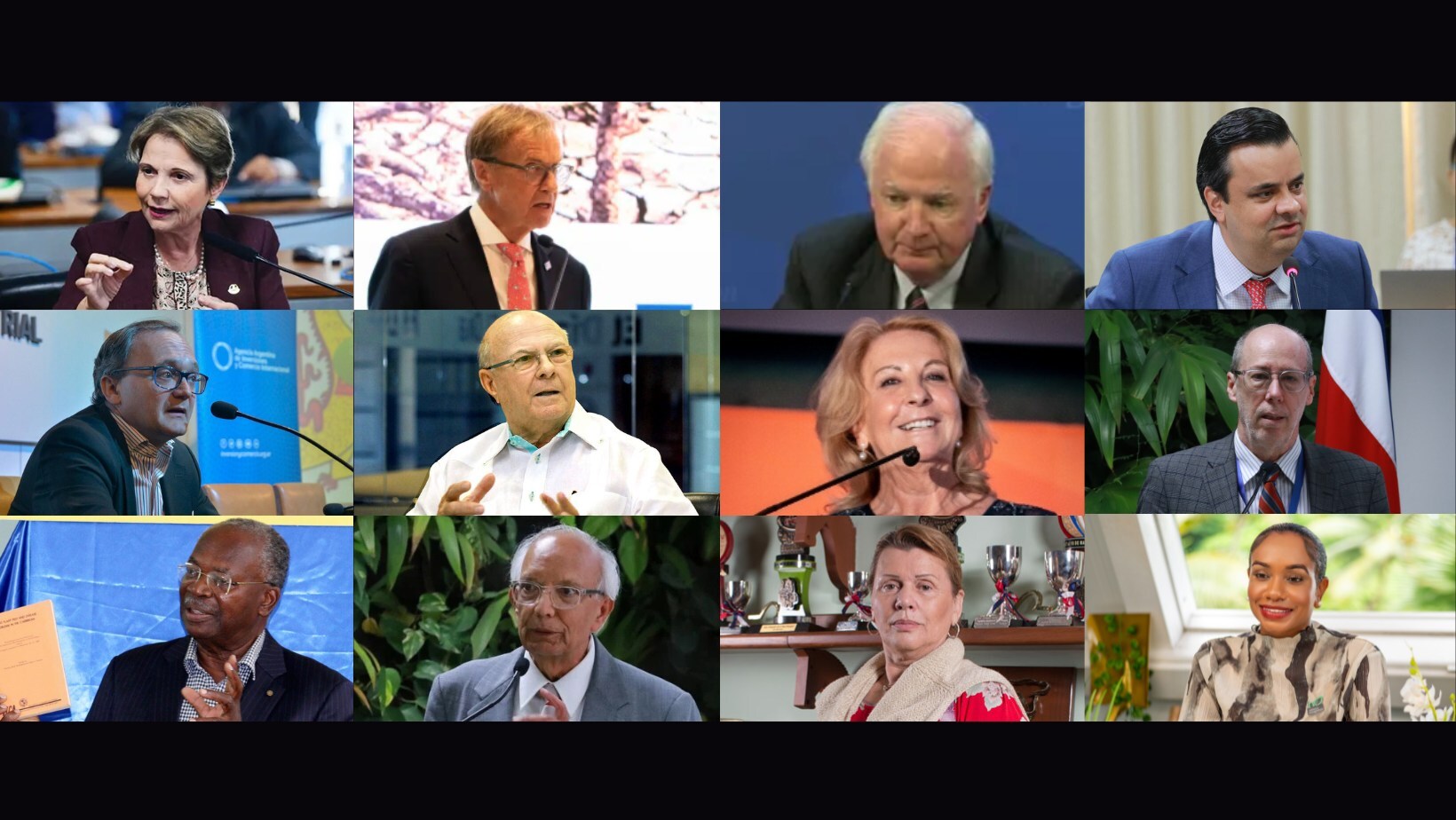SAN JOSE, Costa Rica, July 31, 2025 /PRNewswire-HISPANIC PR WIRE/ — A dozen business, political, diplomatic, academic and social leaders from the Americas signed a letter highlighting the efforts undertaken by the Inter-American Institute for Cooperation on Agriculture (IICA) to drive agricultural production and trade, support farmers and guarantee food security in the region.

The letter underscores the importance and achievements of IICA’s actions. It also describes the Institute’s history promoting scientific and technological advancements since its creation at the Inter-American Conference of Agriculture, held in 1942 in Maryland, United States, to discuss the repercussions of World War II on trade and production.
“After World War II, IICA supported the scientific and technological innovations of the ‘Green Revolution’, which largely emerged in the Americas. Those technological advances led to remarkable declines in hunger worldwide and were the foundation for the emergence of the continent as the leading net food exporting region, becoming a crucial anchor for global food security”, states the letter.
The letter was signed, among others, by Senator Tereza Cristina, former Minister of Agriculture of Brazil; Ambassador Kip Tom, Vice Chair of Rural Policy at the America First Policy Institute (AFPI); Ambassador Kevin Edward Moley, former Assistant Secretary of the Bureau of International Organization Affairs of the U.S. Department of State; and Roberto Perosa, President of the Brazilian Meat Exporters’ Association (ABIEC).
Gustavo Idígoras, President of CIARA-CEC and the Argentinian Agroindustrial Chamber; Hipólito Mejía, former President of the Dominican Republic; Susana Balbo, Argentinian businesswoman and oenologist; Jack Bobo, Executive Director of the Rothman Family Institute for Food Studies at the University of California, Los Angeles (UCLA); Chelston Brathwaite, Director General Emeritus of IICA and former Senator of the Parliament of Barbados; Rattan Lal, professor at The Ohio State University and World Food Prize laureate; Mari Llorens, livestock businesswoman from Paraguay; and Keithlin Caroo-Afrifa, Executive Director of Helen’s Daughters Inc., also signed the letter.
“One of the Institute’s distinctive strengths is its ability to facilitate cooperation among different sectors. In a context where agricultural and food challenges increasingly require coordination among the public sector, farmers, private enterprises, academia, civil society, and international organizations, IICA is uniquely positioned to provide a neutral and credible institutional space for substantive dialogue”, adds the letter.
The letter goes on to note that IICA has consistently advocated for science-based trade practices to counter non–tariff barriers that limit agricultural exports from the Americas. It explains that the Institute also supports countries in implementing scientifically grounded standards and systems to combat animal and plant diseases in the Americas, as exemplified by its efforts to mitigate the transboundary movement of the New World screwworm (NWS) between Mexico and the United States.
In the letter, the signatories state that “Strengthening the role of IICA is a strategic decision. It involves investing in integrated technical solutions, promoting science as an ally of agricultural production, and reinforcing the Americas’ capacity to respond to global challenges with innovation, improving animal and plant health, while promoting policies that facilitate production, diversified and fair agricultural trade, the private sector and markets, and the well-being of rural populations on our continent”.
The full letter and list of signatories is included below:
The Inter-American Institute for Cooperation on Agriculture (IICA) and the new frontier for agriculture in the Americas
Countries in the Americas have a long history of collaboration for the promotion of scientific and technological progress to improve agricultural production and trade, helping farmers and rural development and ensuring food security and nutrition in the Continent. Two notable moments of regional collaboration were the 1930 First Inter-American Conference on Agriculture that took place in Washington, D.C. to address the production and trade problems caused by the Great Depression; and then the 1942 Inter-American Conference on Agriculture held in Maryland, USA, to deal with the trade and production disruptions created by WWII. One of the outcomes of this last conference was the creation of the Inter-American Institute for Cooperation on Agriculture (IICA) to foster agricultural research, education, and technical cooperation, applying scientific advances to improve productivity, pest control, crop yields, and rural development, and thus ensuring food security and economic growth.
In other words, IICA was created to collectively address specific technical problems in agriculture and rural development affecting the farmers and people of the Americas. In the more than 82 years of its existence, IICA has worked with governments, farmers, and the private sector of the continent to do just that.
After World War II, IICA supported the scientific and technological innovations of the “Green Revolution,” which largely emerged in the Americas. Those technological advances led to remarkable declines in hunger worldwide and were the foundation for the emergence of the continent as the leading net food exporting region, becoming a crucial anchor for global food security.
One of the Institute’s distinctive strengths is its ability to facilitate cooperation among different sectors. In a context where agricultural and food challenges increasingly require coordination among the public sector, farmers, private enterprises, academia, civil society, and international organizations, the IICA is uniquely positioned to provide a neutral and credible institutional space for substantive dialogue. The case of the Continental Alliance for Food Security and Sustainable Development is a great example: more than 200 public and private partners are working together on hemispheric challenges, such as food and nutrition security, agro-environmental resilience, agricultural trade, transparent regulatory frameworks, and rural development.
IICA’s role in bringing together the Americas for agricultural diplomacy was also demonstrated at various global forums, including the 2021 UN Summit on Food Systems, where the Institute facilitated the development of collective positions that strengthened the region’s voice at the global level. In this and other instances, the Institute has consistently advocated for science-based trade practices to counter capricious non–tariff barriers that unfairly limit agricultural exports from the Americas.
IICA has been also supporting countries to implement scientifically grounded standards and systems to prevent animal and plant diseases in the Americas. A recent example has been the technical and financial support to screwworm eradication and mitigation of transboundary movements between Mexico and the US. IICA coordinates the Agricultural Health and Food Safety (AHFS) network and the Regional “One Health” Group, addressing other regional challenges such avian flu, fruit fly, and foot and mouth disease.
In partnership with large private sector companies and under the principle of “turning science into action,” it achieved significant results in soil restoration through its Living Soils of the Americas program, with the Lal Carbon Center at Ohio State University.
Following the priorities of its member countries, from the recent Small Family Farmers Policy of the USDA to similar approaches in many other countries, IICA supports family farmers, helping them adapt to specific threats such as soil erosion, droughts, and extreme heat, and promote sensible environmental approaches to enhance resilience and strengthen disaster prevention.
Another important area of IICA’s work relates to biofuels and the bioeconomy, where it has brought together farmers and private companies to help expand access to affordable, reliable and secure energy, and create other production and employment opportunities.
By strengthening rural economies, expanding income opportunities, and building farmers’ resilience to extreme weather events, these programs also tackle some of the root causes of internal and international migration and displacement of population, diminishing the negative impacts on other countries of the Americas.
IICA has promoted production diversification as well, to ensure the affordability of healthy diets and to combat the growing problem of obesity and related diseases, which has led to a series of initiatives in the Americas, from the labeling requirements in Chile, Uruguay and other countries to the US initiative to “Make America Healthy Again.”
Given the multiple challenges and shocks to agriculture and food production and recognizing the concerns about the effectiveness of multilateral institutions and the limitations in financial resources, IICA has continued to prioritize technical assistance focusing consistently on its core responsibilities. It has become a model of efficient, agile, demand-driven, and results-oriented technical cooperation, with strong credibility and recognized influence in regional and global discussions on agriculture, food security, and rural development. And it has performed its functions always hiring the best qualified people, without discrimination of any type; promoting cooperation and the joint work of governments and the private sector; and responsibly managing budgets and resources with transparency and accountability.
Strengthening the role of IICA is a strategic decision. It involves investing in integrated technical solutions, promoting science as an ally of agricultural production, and reinforcing the Americas’ capacity to respond to global challenges with innovation, improving animal and plant health, while promoting policies that facilitate production, diversified and fair agricultural trade, the private sector and markets, and the well-being of rural populations on our continent. With the support of IICA and other partners, farmers in the Americas will continue to feed the population of our continent and will be a fundamental pillar of global food security as the world’s leading net food exporter.
Susana Balbo
IICA Goodwill Ambassador for Rural Youth Issues
Jack Bobo
Executive Director of the Rothman Family Institute for Food Studies at the University of California, Los Angeles (UCLA)
IICA Chair in Global Food Security and Agricultural Innovation.
Chelston W.D. Brathwaite
Director General Emeritus of IICA
Former Senator of the Parliament of Barbados
Keithlin Caroo-Afrifa
Executive Director
Helen’s Daughters Inc.
IICA Goodwill Ambassador for Sustainable Development Issues
Senator Tereza Cristina Corrêa da Costa Dias,
Former Minister of Agriculture, Livestock and Supply, Brazil
Gustavo Idígoras
President of CIARA CEC Argentina
Argentinian Agroindustrial Council
Rattan Lal
Director, CFAES Dr. Rattan Lal Carbon Management and Sequestration Center (C-MASC)
Distinguished University Professor of Soil Science
IICA Chair in Soil Science and Goodwill Ambassador for Sustainable Development Issues
Mari Llorens
IICA Goodwill Ambassador for Sustainable Animal Production Issues
Director of the Zoological and Botanical Garden of Asunción, Paraguay
Ambassador Kevin Edward Moley (Ret)
Former Assistant Secretary for US Department of State Bureau of International Organization Affairs
Hipólito Mejía Domínguez
Former President of the Dominican Republic
IICA Goodwill Ambassador
Roberto Perosa
President
ABIEC – Brazilian Beef Exporters Association
Kip Tom
Vice Chair of Rural Policy
America First Policy Institute (AFPI)

Photo – https://mma.prnewswire.com/media/2742215/Notas_IICA__3.jpg
Logo – https://mma.prnewswire.com/media/2736965/iica_eng_blue_Logo.jpg
SOURCE Inter-American Institute for Cooperation on Agriculture (IICA)





